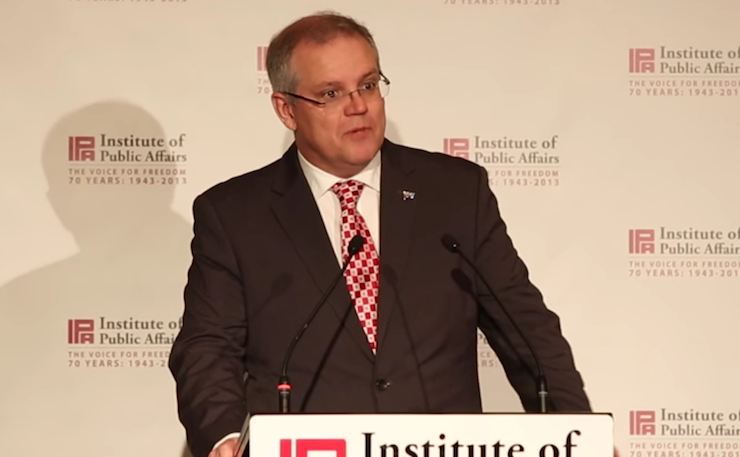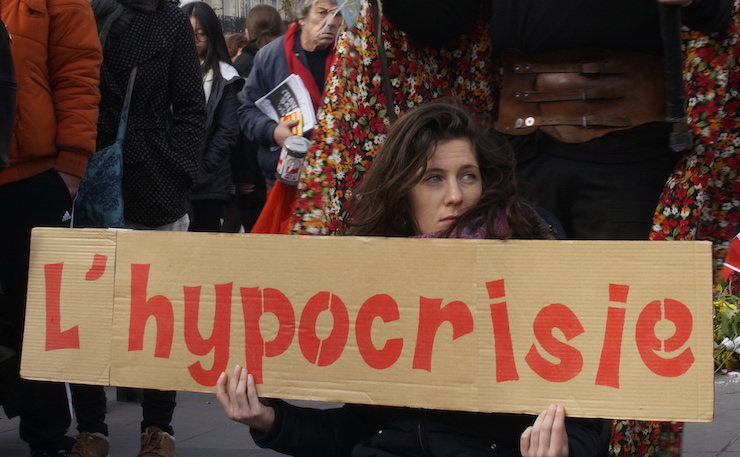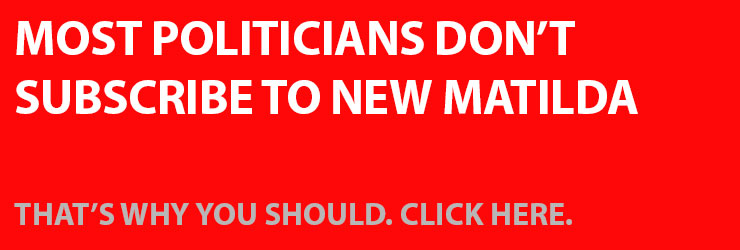After the Paris climate talks Australia has fallen behind the world on climate policy, while our deficit continues to blow out. The Coalition government is squarely to blame, writes Ben Eltham.
As Julie Bishop makes her way back from the heady scenes in Paris over the weekend, it’s worth considering where the climate deal leaves the Coalition government of Malcolm Turnbull in the medium-term.
If Labor had any traction at all in the climate debate, the Paris deal should have been a humiliating defeat for Bishop and Turnbull.
Australia signed up to a deal manifestly incompatible with our domestic policies, with the government’s justifications for new coal mines and the abolition of the carbon tax looking increasingly bizarre. The world will soon forget Greg Hunt, but not before his brief turn as a COP21 fringe comedy act, complete with hilarious punch lines like “I’m not a neo-colonialist.”
The Paris deal is far more ambitious than Bishop and the Turnbull government have admitted, and the scale of climate action it demands of Australia is much more extensive than the current risible target of 26-28 per cent reductions.
Turnbull and his cabinet are in effect hoping that the Paris deal slides through with relatively little further scrutiny, but that seems unlikely. The deal unequivocally puts the future of fossil fuel industries in jeopardy.
Perhaps the government doesn’t really comprehend the significance of COP21. RenewEconomy’s Giles Parkinson wrote a swingeing post from Paris on Sunday, where he pointed out the government was viewed by international observers as completely out of touch. The Australian government, Parkinson wrote, simply “does not understand the enormity of what has been proposed, and agreed to, at these talks.”
It hardly needs saying that the Coalition’s current carbon and environment policies boil down to little more than “dig, baby, dig!” The Turnbull government has no target for 2050, even though this agreement means Australia must inevitably decarbonise, and quickly. There is no legislated cap on carbon emissions in this country. Direct Action is an expensive joke. There is no formal carbon price. The Renewable Energy Target, narrowly surviving the Abbott years with a much lower benchmark, elapses in just five years time.
The sabotage of the Abbott years means that the sweeping economic changes guaranteed by a hotter world will now increasingly be felt by Australians as an economic disruption.
The effect of the Paris deal on the future profitability of fossil fuel industries can only be negative. This will inevitably flow through over time to the budget’s bottom line. Meanwhile, Abbott sabotaged years worth of renewable energy investment, retarding Australia’s competitiveness.
And the government’s bottom line is still in deficit, as we found out in today’s Mid-Year Economic and Fiscal Outlook. The MYEFO’s headline figures saw the federal government deficit worsen by $2.3 billion, mainly because of a drop in revenue. As usual, falling prices for commodities were to blame: particularly iron ore, for which there appears to be a growing global glut.
The deficit continues even at a time of solid economic growth – a steady if not spectacular 2.5 per cent. The budget papers rightly observe that employment in recent months has been growing. Low interest rates could yet go lower. And commodity prices could eventually stabilise.
What’s wrong with the budget? It’s obvious: anaemic revenue. Revenue from taxes hasn’t picked up as quickly as Treasury forecast in May, and commodity prices have collapsed. That’s added to the underlying problem of a budget in structural deficit. The bottom line is still running at negative $37 billion, a larger deficit than the one bequeathed to Joe Hockey by Labor in 2013.
Australian tax revenue remains low by world standards as a percentage of the domestic economy, so there’s clearly scope to raise revenue to balance the budget. Tens of billions of tax subsidies to the rich in the superannuation system are the obvious place to look, as is negative gearing. But the philosophical verities of the Liberal Party mean that Scott Morrison continues to insist the problem is all on the spending side.
Instead, Morrison has today delivered several billion dollars in budget cuts. They are small in the scheme of things, but are still likely to be unpopular. There are more than $1.1 billion in funding cuts to health, for example, as well as several hundred million slashed from aged care and more from vocational training.
These are likely to be painful cuts for the sectors involved. But the real heat could well be political. Hockey showed in 2014 that austerity is unpopular with middle-class voters. Health spending is seen as the most important type of government spending, and cuts are seldom welcomed.
 Morrison must occasionally be forgiven for wondering what sort of revenue a decent carbon tax would now be delivering – if Australia still had one. When the Coalition abolished it, it was pulling in more than $4 billion a year, and forecast to deliver billions more. Of course we’ll never know, but it’s likely a decently designed carbon permit scheme could be pulling in as much as $10 billion a year right now.
Morrison must occasionally be forgiven for wondering what sort of revenue a decent carbon tax would now be delivering – if Australia still had one. When the Coalition abolished it, it was pulling in more than $4 billion a year, and forecast to deliver billions more. Of course we’ll never know, but it’s likely a decently designed carbon permit scheme could be pulling in as much as $10 billion a year right now.
An extra $10 billion wouldn’t fix Australia’s deficit, but it would make Scott Morrison’s job a lot easier.
Instead, we’re getting more cuts. In effect, the spending cuts represent an indirect pollution subsidy, because they help fund the government’s multi-billion dollar gift to big fossil fuel companies. The damage inflicted in the Abbott-Hockey years on renewable energy industries, on science and research, on universities, and on foreign aid will take years to repair. Now health is in the frame. And so the austerity continues.
Superficially, the release of the MYEFO has nothing to deal with the Paris climate deal. But, in a deeper sense, the two are intimately linked.
For reasons more to do with better technologies than government policies, Australia’s economy is already rapidly decarbonising. Electricity consumption continues to fall. Big fossil fuel industries are retrenching and restructuring – some are just hanging on. It is merest common sense to see that the future shape of Australia’s economy, and therefore the Commonwealth budget, will be affected by climate in critical ways.
Climate change is affecting Australia now, and adaptation will get more expensive and more difficult as the century progresses. The Paris deal will accelerate the convergence of global economic policy into a set of low-carbon configurations. It is no longer possible to pretend, as Julie Bishop keeps trying to, that the performance of the economy can be quarantined from consideration of the environment.
Already there are calls from environmentalists for Australian governments to start complying with the spirit of the agreement we have just signed, by banning new coal mines. The giant Carmichael mine planned by Adani for central Queensland will continue to be a lightning rod for civil dissent and for legal action by environmentalists. Anyone betting on new fossil fuel projects getting green-lighted is a very brave day trader indeed.
But the real sovereign risk is the risk accruing to Australia itself, from the consequences of a hotter world.
Donate To New Matilda
New Matilda is a small, independent media outlet. We survive through reader contributions, and never losing a lawsuit. If you got something from this article, giving something back helps us to continue speaking truth to power. Every little bit counts.





